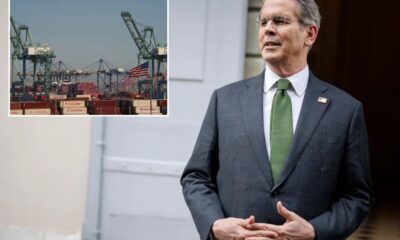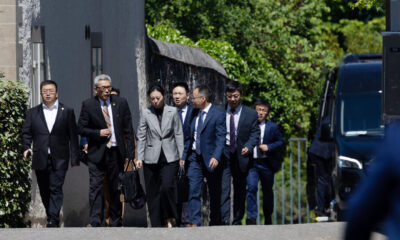Breaking News
U.S. and China Hail Progress, but Does That Mean There’s a Trade Deal?

Financial markets and businesses are eagerly awaiting the outcome of recent trade talks between the United States and China. The negotiations in Geneva over the weekend were described as productive, with both sides expressing optimism but stopping short of definitive declarations.
The talks resulted in what was termed as an “agreement” by Jamieson Greer, the United States Trade Representative, while China’s vice premier for economic policy, He Lifeng, highlighted the constructive nature of the discussions and the establishment of a consultation mechanism. However, the differences in framing the outcome underscored the complexities of trade relations between the two economic giants.
Treasury Secretary Scott Bessent noted “substantial progress” following the talks, with indications of a positive outcome. The White House issued a statement announcing a trade deal with China, sparking optimism in financial markets globally.
The White House’s announcement of a trade deal was met with anticipation of further details in a joint statement to be released by both countries. Market reactions in Asia and S&P 500 futures indicated positive sentiment, although concerns lingered about potential tariff reductions.
The negotiations aimed to address escalating tensions resulting from heavy tariffs imposed by both the U.S. and China earlier in the year. The trade war has had a significant impact on global trade and economic growth.
Leading up to the Geneva meetings, conflicting reports emerged about the nature of the talks between the U.S. and China. The differing perspectives added to the uncertainty surrounding the negotiations.
China’s involvement in the trade discussions was portrayed as a strategic move to prevent further escalation rather than a concession to U.S. tariffs. The talks were seen as vital for safeguarding global economic interests and maintaining dialogue between the two nations.
The trade slowdown has already impacted Chinese factories, with exports to the U.S. declining and importers awaiting a resolution to the tariff dispute.
While news of progress in the trade talks was downplayed in Chinese media, the potential for a positive outcome was emphasized. President Trump’s fluctuating stance on tariffs and the talks was noted, with hopes for a reset in trade relations between the two countries.
Contributed by Christopher Buckley from Taipei, Taiwan.
-

 Destination8 months ago
Destination8 months agoSingapore Airlines CEO set to join board of Air India, BA News, BA
-

 Breaking News10 months ago
Breaking News10 months agoCroatia to reintroduce compulsory military draft as regional tensions soar
-

 Gadgets3 months ago
Gadgets3 months agoSupernatural Season 16 Revival News, Cast, Plot and Release Date
-

 Tech News12 months ago
Tech News12 months agoBangladeshi police agents accused of selling citizens’ personal information on Telegram
-

 Productivity11 months ago
Productivity11 months agoHow Your Contact Center Can Become A Customer Engagement Center
-

 Gadgets3 weeks ago
Gadgets3 weeks agoFallout Season 2 Potential Release Date, Cast, Plot and News
-

 Breaking News10 months ago
Breaking News10 months agoBangladesh crisis: Refaat Ahmed sworn in as Bangladesh’s new chief justice
-

 Toys12 months ago
Toys12 months ago15 of the Best Trike & Tricycles Mums Recommend























